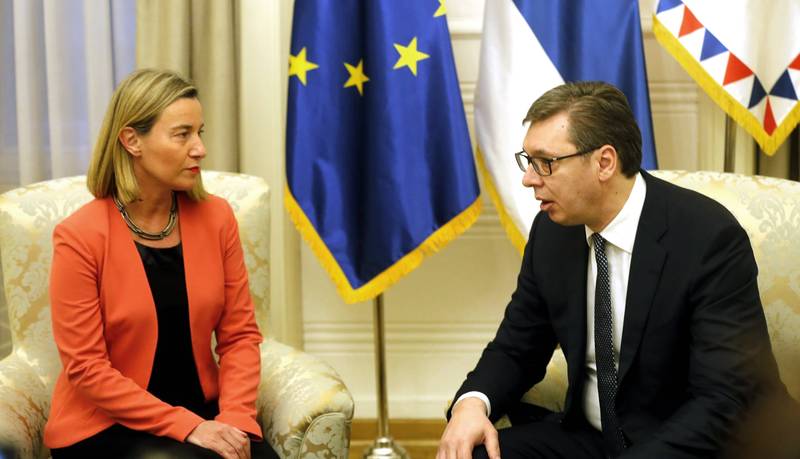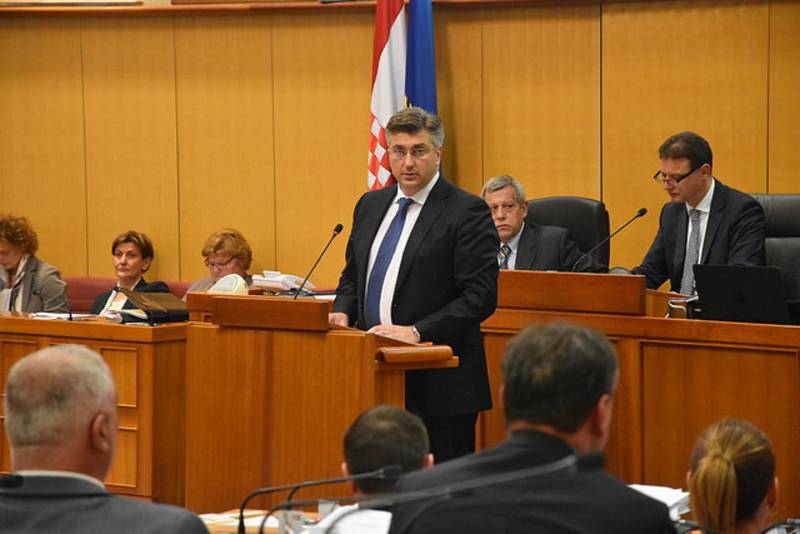The Incident Nobody Saw but Everybody Condemned
Adelina Marini, April 20, 2018
 Serbia and Croatia know very well they have to repair their relations. The former to be able to join the EU, and the latter to avoid being perceived by its partners as an opportunist. It seems, however, that both countries are doing their utmost to show that a repair is impossible. The latest incident between the two countries is a vivid illustration. After the controversial visit in Zagreb of Serbia President Aleksandar Vucic on invitation by his Croatian opposite number Kolinda Grabar-Kitarovic, in Belgrade this week was a delegation of the Croatian Sabor (parliament), led by Speaker Gordan Jandrokovic.
Serbia and Croatia know very well they have to repair their relations. The former to be able to join the EU, and the latter to avoid being perceived by its partners as an opportunist. It seems, however, that both countries are doing their utmost to show that a repair is impossible. The latest incident between the two countries is a vivid illustration. After the controversial visit in Zagreb of Serbia President Aleksandar Vucic on invitation by his Croatian opposite number Kolinda Grabar-Kitarovic, in Belgrade this week was a delegation of the Croatian Sabor (parliament), led by Speaker Gordan Jandrokovic.
The visit coincided with the presentation of the progress reports of the enlargement countries by the European Commission. The same day but several hours earlier, also in the European Parliament, the president of France announced that there will be no further enlargement before the EU had reformed itself. The visit of the Croatian delegation started exactly one week after the leader of the Serbian Radical Party (SRS), Vojislav Seselj, was convicted for war crimes and inciting speech which led to the expulsion of non-Serbian population in Hrtkovci, Vojvodina on 6 May 1992. He received a 10-year sentence but the International Court ruled that the sentence has been served and left Seselj at liberty.
Jandrokovic arrived in the Serbian capital for a two-day visit on invitation by Skupstina Speaker Maja Gojkovic a day before the visit of EU's High Representative for Foreign and Security Policy Federica Mogherini (Italy, S&D). In his programme, there were meetings with Prime Minister Ana Brnabic and President Aleksandar Vucic. Just a few hours after the beginning of the visit, however, it was suspended. The reason was a press release of an incident. In a press release, the SRS informed the public that its leader Vojislav Seselj again set the Croatian flag in flames and cursed the Croats in the parliament. After short consultations with Zagreb, Gordan Jandrokovic announced the visit was cancelled. He admitted, though, that he had not witnessed the incident but was informed about it.
A wave of condemnation followed. The Serbian prime minister condemned the incident in the most decisive way. "I strongly and unequivocally condemn behaviour of Vojislav Šešelj. Desecration of Croatian or any other flag or state symbol and insulting of official delegations visiting our country is not behaviour that represents Serbia, values of our Government and majority of our citizens", her statement reads. It is the first against Seselj's activities aimed at Croatia.
The incident was condemned by the host of the visit, too, Maja Gojkovic, who said that "the demonstrated disrespect for the Republic of Croatia's state symbols, whose delegation, led by Sabor Speaker Gordan Jandrokovic, is on its first historic visit in Serbia, is inadmissible and is an insult for the Serbian people as well, which is known for its hospitality", Ms Gojkovic said.
As could be expected, the reaction of Serbian President Aleksandar Vucic, who is a former comrade of Vojislav Seselj, said that as president he condemns all kinds of violence and threats, as well as insulting the flag of any state. "We are sending a very bad message", he said. In the same time, he recalled that he, too, was the subject of insults during his February visit in Zagreb but this did not seem to him worth leaving. Aleksandar Vucic was on a visit in Zagreb on 12 February. His visit caused a big controversy in the public.
War veterans and widows of soldiers killed during Croatia's independence war from former Yugoslavia organised a protest at the central Zagreb square and at the government square. They called Vucic a "chetnik" and the Croatian president "a traitor" for inviting him. The protesters also reminded Vucic of his speech in the presence of Vojislav Seselj in the occupied town of Glina in 1995. The protest was kept by the police far enough. Vucic also recalled that Federica Mogherini too was a victim of Seselj's and his people in the Skupstina but she endured and continued her speech in a terrible environment - Seselj's people were shouting all the time during her 20-minute speech last year in the Skupstina, attended by Vucic, too, who was still a prime minister at the time.
In Zagreb, Prime Minister Andrej Plenkovic opened the weekly government meeting condemning the incident and saying that he expects Serbia to condemn strongly and unequivocally the actions of the deputy Seselj. He recalled that, with its final verdict, the International Court confirmed his instigating behaviour which led to the "severest crimes in the Homeland war in Croatia". Plenkovic assured that his government will continue to work to build relations with the neighbours but warned that it will react decisively at any such actions. The president and the opposition, too, condemned the incident nobody saw.
A day later, the Skupstina said that the place where the setting on fire of the Croatian flag happened there were no cameras and at a special news conference Vojislav Seselj was angry that nobody believed him. The European Commission also joined the series of condemnations. Spokesman Carlos Martin Ruiz de Gordejuela said that "what we saw yesterday does not belong to a democratic institution. It's actually disrespectful of a democratic institution representing the citizens, and all of those who work on good neighbouring relations, regional relations and reconciliation".
Vojislav Seselj has been dominating the Serbian media on a daily basis because his final sentence raised the question when he will be released of his duties as a member of parliament. According to the law, he has no right to be a deputy if he is convicted but this decision has to be taken by the Skupstina. Media have been asking a whole week when this will happen. In the meantime, he has been tormenting for weeks the only Croatian member of the Skupstina, Tomislav Zigmanov, and the members who defend him - Aleksandra Jerkov and Nenad Canak.
The Serbian Radicals are insulting and threatening every day the three deputies in the Skupstina  plenary. According to media reports, the authorities have not yet reacted to these threats.
plenary. According to media reports, the authorities have not yet reacted to these threats.
A day after the incident (19 April), in Belgrade arrived Federica Mogherini on a long-planned visit. The main purpose of the visit was to push harder for results in the dialogue between Belgrade and Pristina but during the very short press conference after their one-hour long meeting with President Vucic she, too, condemned the incident with Seselj, recalling that she herself was a victim of his behaviour in the Serbian parliament. She explicitly mentioned the Croatian premier, Plenkovic, agreeing with him that dialogue must continue. Vucic once again commented on the incident, not missing to remind that "much worse incidents" in neighbour countries have never been condemned. He also hinted that what is being condemned is something that nobody knows if it really happened and which only Seselj speaks of.
 Kolinda Grabar-Kitarovic | © KGK
Kolinda Grabar-Kitarovic | © KGK Jozo Rados | © European Parliament
Jozo Rados | © European Parliament Andrej Plenkovic | © Vlada RH
Andrej Plenkovic | © Vlada RH Bakir Izetbegovic, Andrej Plenkovic | © Council of the EU
Bakir Izetbegovic, Andrej Plenkovic | © Council of the EU Aleksandar Vucic, Recep Tayyip Erdogan | © Serbian Presidency
Aleksandar Vucic, Recep Tayyip Erdogan | © Serbian Presidency Jean-Claude Juncker, Zoran Zaev | © European Commission
Jean-Claude Juncker, Zoran Zaev | © European Commission